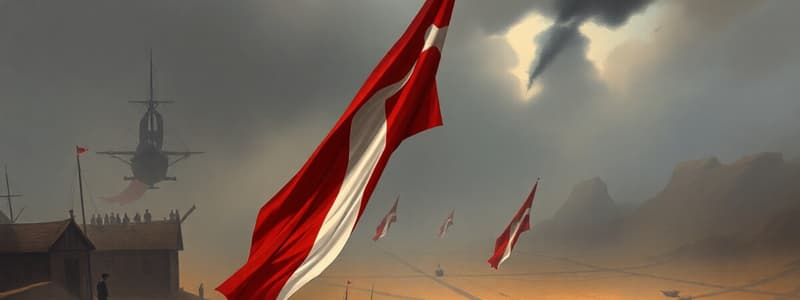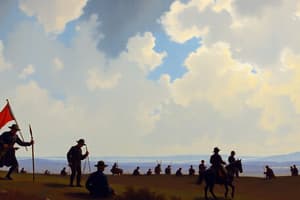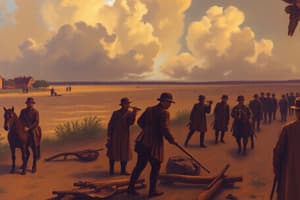Podcast
Questions and Answers
What event is considered the immediate catalyst for the start of World War I?
What event is considered the immediate catalyst for the start of World War I?
- The sinking of the Lusitania.
- The German invasion of Belgium.
- The signing of the Treaty of Versailles.
- The assassination of Archduke Franz Ferdinand. (correct)
What was the primary reason Germany sought alliances with other countries prior to World War I?
What was the primary reason Germany sought alliances with other countries prior to World War I?
- To protect themselves from potential French aggression. (correct)
- To establish a naval blockade against Great Britain.
- To gain access to overseas colonies.
- To promote free trade within Europe.
Why did the Triple Alliance's attempt to include Russia fail?
Why did the Triple Alliance's attempt to include Russia fail?
- Russia insisted on including France, which was unacceptable to Germany.
- Russia was already in secret negotiations with Great Britain.
- The relationship between Germany and Russia had deteriorated. (correct)
- Germany refused to acknowledge Russia's territorial claims in the Balkans.
How did Germany's perception of the Russian military influence their early strategy in World War I?
How did Germany's perception of the Russian military influence their early strategy in World War I?
What was the strategic significance of Belgium in Germany's initial war plans?
What was the strategic significance of Belgium in Germany's initial war plans?
What motivated Great Britain to defend Belgium during World War I?
What motivated Great Britain to defend Belgium during World War I?
How did Italy's allegiance shift during World War I?
How did Italy's allegiance shift during World War I?
What impact did the Ottoman Empire's alliance with the Central Powers have on the overall conflict?
What impact did the Ottoman Empire's alliance with the Central Powers have on the overall conflict?
What was a significant consequence of Russia's military struggles and internal conflict during World War I?
What was a significant consequence of Russia's military struggles and internal conflict during World War I?
What event prompted the United States to abandon its policy of isolationism and enter World War I?
What event prompted the United States to abandon its policy of isolationism and enter World War I?
What was the 'convoy system' employed by the United States during World War I, and what purpose did it serve?
What was the 'convoy system' employed by the United States during World War I, and what purpose did it serve?
How did the increasing rebellions within Germany contribute to the end of World War I?
How did the increasing rebellions within Germany contribute to the end of World War I?
What was the primary objective of Germany in initiating the Battle of Ypres?
What was the primary objective of Germany in initiating the Battle of Ypres?
How did the influenza pandemic of 1918 impact the course of World War I?
How did the influenza pandemic of 1918 impact the course of World War I?
What were the main goals of the Paris Peace Conference following World War I?
What were the main goals of the Paris Peace Conference following World War I?
What was the primary purpose of the 'July Ultimatum' issued by Austria-Hungary to Serbia?
What was the primary purpose of the 'July Ultimatum' issued by Austria-Hungary to Serbia?
What long-term impact did the Treaty of Versailles have on Germany?
What long-term impact did the Treaty of Versailles have on Germany?
What technological development led to the creation of trench warfare?
What technological development led to the creation of trench warfare?
What factor most significantly contributed to the weakening of Russia's military during World War I?
What factor most significantly contributed to the weakening of Russia's military during World War I?
Which of the following best describes the strategic dilemma Germany faced regarding Russia in World War I?
Which of the following best describes the strategic dilemma Germany faced regarding Russia in World War I?
What was 'trench warfare' and how did it influence the character of fighting during World War 1?
What was 'trench warfare' and how did it influence the character of fighting during World War 1?
What influence did Charles Darwin's theory have on Germany's attitude toward the war?
What influence did Charles Darwin's theory have on Germany's attitude toward the war?
How did the driver's wrong turn play a role in Archduke Ferdinand's assassination?
How did the driver's wrong turn play a role in Archduke Ferdinand's assassination?
Why did Austria-Hungary wait one month to respond to Archduke Ferdinand's death?
Why did Austria-Hungary wait one month to respond to Archduke Ferdinand's death?
What items were part of the July Ultimatum?
What items were part of the July Ultimatum?
When did Austria-Hungary declare war on Serbia?
When did Austria-Hungary declare war on Serbia?
Why did Germany want to attack France first?
Why did Germany want to attack France first?
Why did Germany need to invade Paris through Belgium?
Why did Germany need to invade Paris through Belgium?
What did Belgium's ports contribute to?
What did Belgium's ports contribute to?
Which of these answers accurately defines the Triple Alliance in 1914?
Which of these answers accurately defines the Triple Alliance in 1914?
Which of these answers accurately defines the Triple Entente in 1914?
Which of these answers accurately defines the Triple Entente in 1914?
By what moniker did the Americans that fought in Europe get?
By what moniker did the Americans that fought in Europe get?
Why did the allied countries to stop sending supplies and reinforcements to Russia?
Why did the allied countries to stop sending supplies and reinforcements to Russia?
What was the final agreement that effectively ended the war?
What was the final agreement that effectively ended the war?
Which of these demands were part of the the Treaty of Versailles?
Which of these demands were part of the the Treaty of Versailles?
Which tactic played the biggest role in transporting troops to Europe safely?
Which tactic played the biggest role in transporting troops to Europe safely?
Was Russia's impact to the Triple Entente a big loss?
Was Russia's impact to the Triple Entente a big loss?
What was Germany hoping to accomplish after The Battle of Ypres?
What was Germany hoping to accomplish after The Battle of Ypres?
Which countries are considered the 'Big Four'?
Which countries are considered the 'Big Four'?
Flashcards
World War I Start Date
World War I Start Date
World War I started on June 28, 1914.
Cause of World War I
Cause of World War I
World War I started with the assassination of Archduke Francis Ferdinand of Austria and his wife Sophie.
Archduke's Assassin
Archduke's Assassin
The assassination of Archduke Franz Ferdinand was carried out by Serbian-Bosnian Gavrilo Princip.
Franco-Persian War Result
Franco-Persian War Result
Signup and view all the flashcards
Triple Alliance Founder
Triple Alliance Founder
Signup and view all the flashcards
Russia and the Triple Alliance
Russia and the Triple Alliance
Signup and view all the flashcards
Triple Entente
Triple Entente
Signup and view all the flashcards
German Superiority Belief
German Superiority Belief
Signup and view all the flashcards
Archduke's Visit
Archduke's Visit
Signup and view all the flashcards
Assassination Cause
Assassination Cause
Signup and view all the flashcards
Princip's Opportunity
Princip's Opportunity
Signup and view all the flashcards
Assassination Blame
Assassination Blame
Signup and view all the flashcards
Austria-Hungary's Delay
Austria-Hungary's Delay
Signup and view all the flashcards
"July Ultimatum"
"July Ultimatum"
Signup and view all the flashcards
July Ultimatum Terms
July Ultimatum Terms
Signup and view all the flashcards
Germany's Initial Attack
Germany's Initial Attack
Signup and view all the flashcards
Request Through Belgium
Request Through Belgium
Signup and view all the flashcards
War with Belgium
War with Belgium
Signup and view all the flashcards
Great Britain's Involvement
Great Britain's Involvement
Signup and view all the flashcards
Italy's Alliance Switch
Italy's Alliance Switch
Signup and view all the flashcards
Ottoman Empire's Alliance
Ottoman Empire's Alliance
Signup and view all the flashcards
Russia's Eastern Front
Russia's Eastern Front
Signup and view all the flashcards
Germany Conquers Russia
Germany Conquers Russia
Signup and view all the flashcards
US Enters WWI
US Enters WWI
Signup and view all the flashcards
New Members
New Members
Signup and view all the flashcards
Surrender Order
Surrender Order
Signup and view all the flashcards
AEF Leader
AEF Leader
Signup and view all the flashcards
The Convoy System
The Convoy System
Signup and view all the flashcards
German U-Boat Usage
German U-Boat Usage
Signup and view all the flashcards
US Trade Partner
US Trade Partner
Signup and view all the flashcards
Sinking of the Lusitania
Sinking of the Lusitania
Signup and view all the flashcards
Trench Warfare
Trench Warfare
Signup and view all the flashcards
Battle of Ypres
Battle of Ypres
Signup and view all the flashcards
Desire to secure ports English Channel.
Desire to secure ports English Channel.
Signup and view all the flashcards
Paris Peace Conference 1919
Paris Peace Conference 1919
Signup and view all the flashcards
Paris Peace Conference Leaders
Paris Peace Conference Leaders
Signup and view all the flashcards
Treaty of Versailles
Treaty of Versailles
Signup and view all the flashcards
Paris Peace Conference Leaders
Paris Peace Conference Leaders
Signup and view all the flashcards
Reasons Russia needed to exit World War One with the Treaty of Brest Litovsk.
Reasons Russia needed to exit World War One with the Treaty of Brest Litovsk.
Signup and view all the flashcards
Study Notes
World War I Begins
- World War I started on June 28, 1914.
- The assassination of Archduke Francis Ferdinand of Austria and his wife Sophie was the catalyst.
- The assassination was carried out by Gavrilo Princip, a Serbian-Bosnian.
Tensions in Europe
- There had been deep-seated tensions and conflicts among European countries since the 19th century.
Franco-Persian War Impact
- After the Franco-Persian War in 1870, Germany won and took control of the 2 provinces of France: Lorraine and Alsace.
- Germany feared France would reclaim their land, leading them to seek allies.
Triple Alliance Formation
- Otto Von Bismarck of Germany created the Triple Alliance.
- The Triple Alliance consisted of Germany, Italy, and Austria-Hungary.
Triple Entente Formation
- The Triple Alliance initially sought Russia as a member, but relations between Germany and Russia were strained.
- Russia then allied with Great Britain and France to form the Triple Entente.
German Beliefs
- Germans believed they were superior to other races.
- They were influenced by Charles Darwin's "Survival of the Fittest" theory.
- Germany wanted to conquer all of Europe.
Assassination Details
- It took two attempts to assassinate the heir.
- Archduke Francis Ferdinand traveled to Sarajevo, Bosnia, to visit injured Austria-Hungary's soldiers.
- The assassination succeeded due to the driver, Leopold Lojka, making a wrong turn.
- Gavrilo Princip seized the opportunity presented by the wrong turn to assassinate the Archduke.
- The Serbian government was blamed for the assassination.
- The assassination was a primary cause of the war in Europe.
Austria-Hungary's Response
- Austria-Hungary waited a month to declare war to avoid appearing as the aggressor.
- Austria-Hungary wanted to protect its reputation and secure support from allies.
- Instead of declaring war immediately, Austria-Hungary issued the "July Ultimatum."
- The ultimatum was delivered to Baron Wladimir Giesl von Gieslingen, the former Austro-Hungarian Minister to Serbia.
- The July Ultimatum stated all demands must be met within 48 hours, or Austria-Hungary would attack Serbia.
July Ultimatum Demands
- Suppress publications inciting hatred against the Austrian Monarchy using existing laws against incitement.
- Dissolve Narodna Odbrana (National Defense) and similar groups that promote Serb nationalism in Austria-Hungary, and prevent them from reforming.
- Eliminate propaganda against Austria-Hungary from public education in Serbia.
- Remove military and administration officers guilty of propaganda against Austria-Hungary, with Austria-Hungary reserving the right to provide names.
- Accept Austro-Hungarian collaboration in Serbia to suppress subversive movements against the monarchy's territorial integrity.
- Begin a judicial inquiry into the accessories of the June 28th plot on Serbian territory, with Austro-Hungarian government participation.
- Immediately arrest Major Vojislav Tankosić and Milan Ciganović, who were implicated by Austria-Hungary's preliminary investigation.
- Prevent Serbian authorities from assisting in illicit arms and explosives traffic across the border between Serbia and Austria-Hungary. Punish members of the Serbian Frontier Service who assisted authors of the Sarajevo outrage.
- Provide explanations regarding statements from high Serbian officials expressing hostility towards Austria-Hungary.
- Notify Austria-Hungary by 5:00 PM on July 25, 1914, of the execution of these measures.
War Declaration
- With an agreement that Serbia would not abide by the July Ultimatum, Austria-Hungary began planning for war.
- 40 days after the Archduke's death, Austria-Hungary commenced its attack on Serbia.
Germany's Strategy
- Germany also initiated attacks on France and Russia.
- Knowing the Russian military was not as strong, Germany aimed to enter Paris by attacking France first.
- Germany requested passage through Belgium to enter Paris.
War with Belgium
- Belgium's refusal to allow passage led to war between Germany and Belgium.
Great Britain's Involvement
- Great Britain considered Belgium its responsibility.
- Belgium's ports greatly contributed to Great Britain's trade and military operations.
Shift in Alliances
- Italy, originally part of the Triple Alliance, joined the Triple Entente.
- Austria-Hungary and Germany did not view this as a disadvantage as they allied with the Ottoman Empire.
- The Ottoman Empire is now known as Turkey.
Failed Paris Attack
- The inability to gain support resulted in the plan to attack and conquer Paris failing.
Russia's Strength
- Russia's forces grew more rapidly than Germany had anticipated.
Eastern Front
- Due to unforeseen events, Germany shifted forces to the Eastern Front.
- Croatia was recovered from German occupation.
- The combined forces of Great Britain, France, and the Belgian Army pushed back advancing German soldiers.
Battle of Ypres
- Germany aimed to restore its strength and sought to control ports in the English Channel to cut off enemy supplies.
- Germany failed in the Battle of Ypres, with 250,000 deaths.
- The Battle of Ypres occurred on October 19, 1914.
- The accepted reasoning for the Ypres battle was the Germans wanting to secure English Channel ports and the British Army's supply lines.
Trench Warfare
- Faced with prolonged warfare, European countries sought protection for their soldiers.
- Trench Warfare was introduced as a fighting method in which both sides dug deep trenches to defend against artillery and machine guns.
- Trench conditions were complicated, dirty, bloody, cold, with limited food and the smell of dead bodies.
- New chemical warfare made conditions even more brutal.
Russia's Struggles
- Although Russia initially won and overthrew part of East Germany, they were pushed back by Austria-Hungary and Paul Von Hindenburg.
- Gradual expansion and occupation of Germany weakened Russia, reducing its military strength and supplies.
Russia's Internal Issues
- Allied countries could not send supplies to Russia, as the enemy controlled the Baltic Sea, Mediterranean Sea, and Black Sea.
- The ongoing Civil War in Russia went hand in hand with other conflicts making progress slow.
- The Civil War was a result of the emergence of opposition against the Bolsheviks after November 1917.
Russia's Withdrawl from the War
- The "Tsar" or "Caesar” of Russia was replaced.
- The new Russian government withdrew from the war due to a lack of supplies, weapons, food, and the death of many soldiers.
- Germany conquered Russia.
United States Joins the Allies
- Russia's loss to the Triple Entente was offset by the United States joining them.
- The United States wanted revenge for the sinking of their ships, loss of supplies, and wealth.
U.S. Neutrality and Shift
- The United States had a strong tradition of Isolationism before World War I.
- America began leaning towards the allies due to harsh war tactics of Germany.
German U-Boats
- Germany began utilizing U-boats as weapons against Allied powers.
U.S. Trade with Great Britain
- The U.S. primarily traded with Great Britain early in WW1 due to naval blockades preventing Germany from trading with other powers.
Lusitania Sinking
- On May 1, 1915, the Lusitania, a British luxury liner with over 1900 passengers, was torpedoed by a German U-Boat.
- The Lusitania sinking killed 1200 people, including 128 Americans.
Sussex Torpedoing
- On March 24, 1916, the Sussex was torpedoed by German U-Boats.
U.S. Entry into WWI
- The United States joined the Allied Forces on April 6, 1917.
American Expeditionary Force
- The Americans who fought in Europe were known as the AEF (American Expeditionary Force).
- General John J. Pershing led the AEF.
Convoy System
- To safely transport troops to Europe, the U.S. used the "convoy system.“
- In the convoy system troop transports were surrounded by destroyers or cruisers for protection.
Japan and Portugal Join
- Japan and Portugal joined the Triple Entente and took over parts of Germany in South East Asia.
Germany's Decline
- As the war continued, Germany's funds and supplies decreased as rebellions rose inside Germany.
End of the War
- The Ottoman Empire (Turkey) surrendered first, followed by Austria-Hungary.
- Germany surrendered late after its "Caesar" was deposed and replaced by a new leader.
- As countries surrendered soldiers came out of the Trench Warfare and they hugged each other which signaled that World War I was over.
Pandemic on the Home Front
- An influenza pandemic broke out in Europe in 1918, spreading to the United States.
- Nearly half of the American soldiers that died during WWI were lost to the flu.
- This specific influenza was like none that have ever been seen before.
- Nearly 675,000 Americans were lost to the influenza pandemic.
Paris Peace Conference
- The Paris Peace Conference was a series of diplomatic meetings that occurred on January 12, 1919.
- These meetings were held to establish the terms of peace after World War I.
- The conference took place at Versailles, outside of Paris.
- It was attended by nearly 30 nations.
- The main decision-makers were the "Big Four” or the “Triple Entente.”
- The Big Four included President Woodrow Wilson, British Prime Minister David Lloyd George, French Premier Georges Clemenceau and Italian Prime Minister Vitto to Orlando
Treaty of Versailles
- The Treaty of Versailles held Germany solely responsible for the war.
- The treaty made Germany pay massive reparations for war damages.
- The treaty limited the size of the German army.
- The Treaty of Versailles led to the establishment of a League of Nations.
- Central Powers were required to relinquish all of their colonies to the allies.
- Germany was required to pay an equivalent of 20 billion gold marks, totaling $5 billion in gold, commodities, ships, securities, or other forms.
Studying That Suits You
Use AI to generate personalized quizzes and flashcards to suit your learning preferences.




